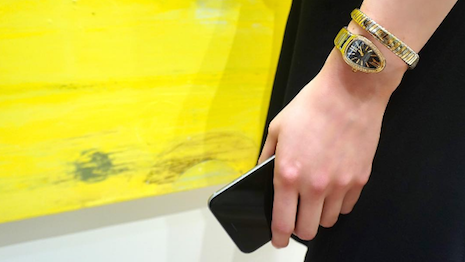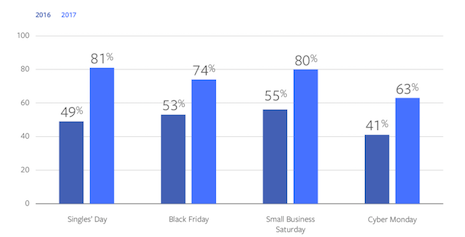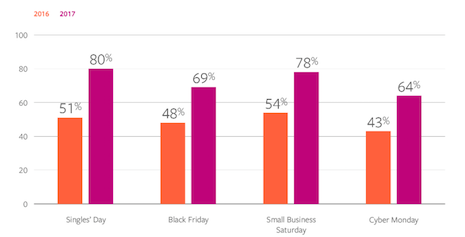 Mobile shopping, especially on Singles' Day, was huge last year. Image credit: Neiman Marcus
Mobile shopping, especially on Singles' Day, was huge last year. Image credit: Neiman Marcus This past holiday season, mobile shopping grew as the channel of choice for consumers in the United States.
In a report conducted by Facebook, data showed that customers picked mobile over desktop at a rate of 81 percent on Singles' Day Nov. 11 and 74 percent on Black Friday, Nov. 24. As time goes on, Facebook has seen more customers embrace mobile shopping and retailers adjust their strategies to adapt to the increased focus on the mobile channel.
“As more consumers use their mobile device for shopping and buying, retailers need to continue to optimize their e-commerce site for mobility," said Marty Whitmore, senior vice president and practice lead at BRP, Boston. "Focusing on lighter content for fast loading, better visual formats for mobile, less clicks and ‘on-click’ transactions to make the purchase frictionless.
"To attract more mobile shopping retailers will need to also shift more of their marketing spend to mobile advertising," he said. "Mobile apps are also a great way to increase engagement with loyal customers.
"The challenge is make your app very compelling so that consumers download and use your app, as they typically will only keep three or four ‘retail’ mobile apps on their device. Key app features that add value include tracking orders and getting real-time updates on services such as delivery time.”
Global mobile
Mobile shopping has been at the forefront of retailers’ minds for a few years now, but this holiday season drove home just how important it has become to consumers.
In a new report from Facebook, the two companies looked into the data around ad conversions on Facebook throughout the holiday season, particularly on big days such as Singles’ Day, Black Friday and Cyber Monday on Nov. 27.
What they found was that both in the U.S. and across the world, mobile commerce is overtaking desktop shopping as the preferred method of online retail.
Share of online shopping from mobile in the U.S. in 2016 and 2017. Image credit: Facebook
In the U.S., Black Friday mobile shopping was at 74 percent in 2017, compared to 53 percent the year before. Similarly, Singles’ Day, the popular shopping day that originated in China, saw U.S. mobile shopping conversions at 81 percent versus 49 percent the year before.
The heightened appeal of Singles’ Day in the U.S. shows another major trend of the report, the globalization of once-regional shopping days.
For example, Singles’ Day originated in China while Black Friday originated in the U.S., but now both days see major spikes in shopping traffic among countries around the world, mainly through mobile.
Mobile has turned participation in the regional events into a global phenomenon that can be enjoyed by people around the world.
Mobile surge
At the beginning of 2017, mobile’s potential was already deeply felt.
Millennials increasingly turn to mobile to enhance their in-store experience, with 96 percent of millennials making purchases at stores at which they used their mobile devices to shop.
A report from International Council of Shopping Centers has analyzed the data from this holiday season, identifying trends in shopping patterns. One of the things they found was that millennials overwhelmingly use mobile as a shopping companion (see story).
Mobile has also been a huge boon for advertisers. Over the next five years, mobile will contribute 69 percent of the projected $19 billion in revenue that comes from paid search advertising.
While the overall share of advertising revenue from search will decrease, it will remain the biggest driver of digital advertising, according Forrester's "Search Marketing Forecast, 2017 to 2022" report. This presents an opportunity for luxury brands to capitalize on mobile advertising and the unique capabilities afforded by the channel (see story).
Share of online shopping from mobile globally in 2016 and 2017. Image credit: Facebook
Mobile also plays a large role for luxury consumers traveling in Asia. As the millennial generation comes into the age when luxury travel becomes a major pastime, mobile is emerging as a key way of reaching these consumers and allowing them to easily book their trips.
In a new report from Criteo on millennial travelers in the Asia-Pacific region, 37 percent of respondents said that they use travel apps to book and manage their trips abroad. The number of millennials taking luxury trips is growing and companies need to be aware of how they are managing those trips if they want to make the most of this surge (see story).
With mobile’s star on the rise, retailers and brands across the world must be aware of how it is changing the shopping landscape for all customers.
“For U.S.-based retailers that don’t have a global presence today the challenge will be to build a global logistics capability," Mr. Whitmore said. "Without a global e-commerce site, is difficult to fully participate in global events like Single’s Day.
"Fortunately, there are ways to expand to global markets quickly by leveraging cross-border global commerce services that accelerate the development of global e-commerce sites and navigate cross-border logistics.”

